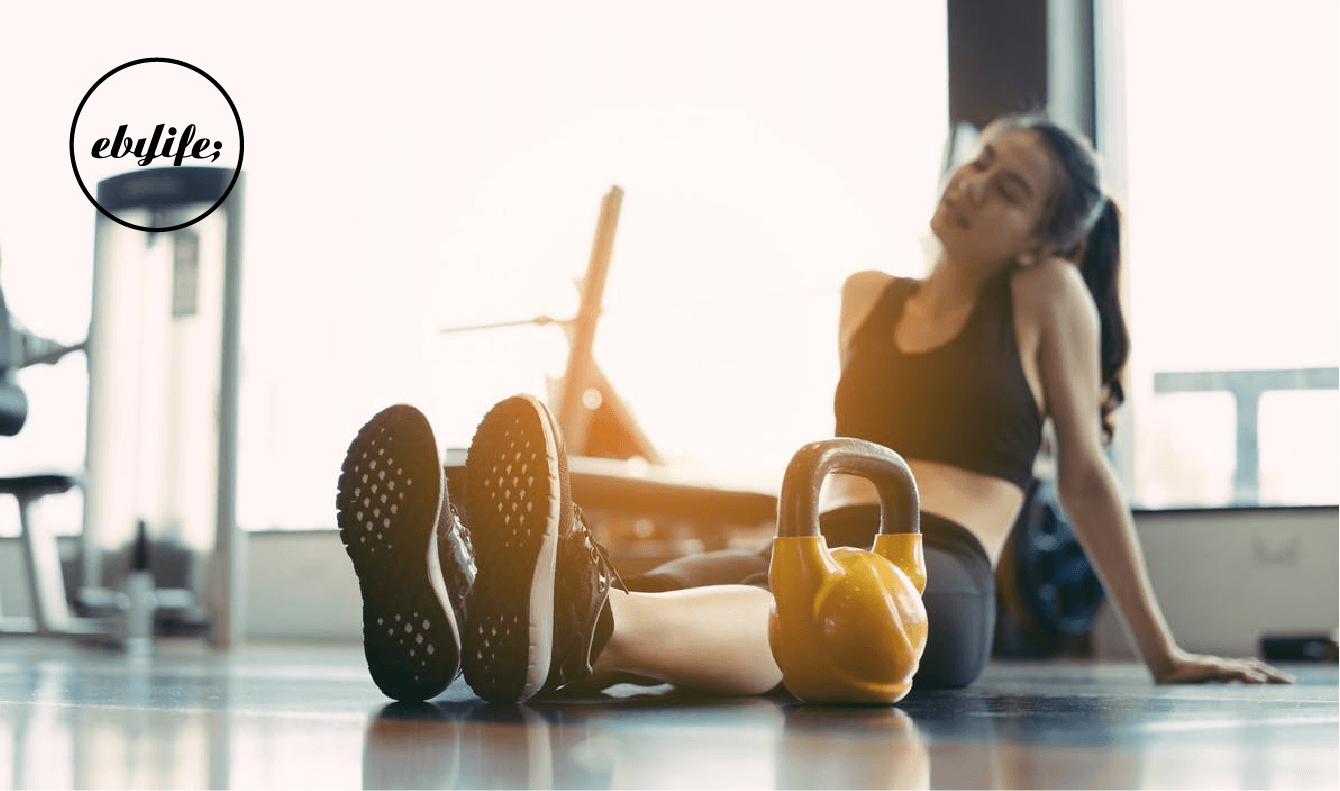Do you need a rest day or are you just being Lazy? Signs and symptoms of overtraining
Written by Martin Ebner, Head PT and sports nutrition specialist at Ebylife.
Unless you're a Navy seal preparing for a life or death mission impossible, the expression, “the only workout you regret, is the one you didn't do” is frankly, utter nonsense and doesn't apply to 99.9% of the population. Overtraining can not only be dangerous, but it can also have a negative impact on your day-to-day life. But how do you know when you’re overtraining compared to when you’re just being lazy!?
Some common symptoms of overtraining syndrome (OTS) include:
Exercise-related symptoms
A plateau or decline in workout performance or progress.
An increased perceived rate of exertion (how difficult it feels) during what would normally be an easy workout.
Excessive sweating or overheating.
An overall feeling of lethargy, heaviness, tightness and/or muscle pain.
Inability to recover from workouts.
Repetitive strain injuries, such as muscle sprains, tendonitis and joint pain.
A loss of enjoyment or motivation during workouts.
Physical and systemic related symptoms
Persistent fatigue and low energy throughout the entire day.
An increased resting heart rate (RHR) and/or blood pressure.
Unexplained weight loss or weight gain.
Disordered eating and loss of appetite.
Digestive problems such as constipation and diarrhea.
Reduced libido and menstruation changes (irregular periods).
Regularly getting sick (colds, flu, etc).
Physiological related symptoms
A lack of motivation, sadness, and depression.
Poor self-confidence.
A lack of enjoyment from things that would otherwise bring pleasure (social events, hobbies, etc).
Mood swings.
Problems falling asleep or poor sleep quality.
Loss of concentration.
As you can see, there are more than a few symptoms associated with overtraining. Some are more severe than others and while you may be thinking that only athletes, fitness junkies and “gym rats” need to worry about OTS, you'd be surprised. While yes, it’s far more likely for fitness professionals to suffer from overtraining, everyday mortals like you and I are also vulnerable to OTS due to additional lifestyle factors such as high-stress levels, long working hours, little access to recovery tools and services, poor planning and inconsistent and/or poor-quality sleep. All of which can impact our wellbeing and lead to overtraining if not careful.
What to consider before you workout?
As a trainer, I always have a quick chat with clients at the beginning of each session to try and gauge where they are on any given day. If they’re having a tough day or week, there's little point in me pushing them beyond their comfort levels if there's little benefit in return. Something to keep in mind is that there’s a fine line between the right amount and too much. Unless you’re an athlete or training for something very specific, you want to come away from each session feeling good, not worse off than before your session.
Here are a few things you should ask yourself before your workout.
Did you have a good night's sleep?
A good night’s sleep generally means at least 6 hours of high-quality sleep. Less than that and your ability to perform and recovery could be greatly reduced.
Related articles on sleep:
Have you eaten enough nutritious foods?
A deep-fried Mars bar may taste great but will not support your health and fitness goals. If you don’t regularly provide adequate fuel both in terms of quality and quantity, not only will your workouts suffer, your body’s ability to recover between sessions could be diminished.
See: How to Combat the Nutritional Decline of Fruits and Vegetables
Is your resting heart rate higher than usual?
It's little surprise that just about every device from our phones to our smartwatches now monitor our heart rate. Resting heart rate is a good indication of our overall well-being. As a general rule, the fitter we are, the lower our resting heart rate (RHR) will be. This is a result of more efficient heart function and cardiovascular fitness. If you notice that your resting heart rate is abnormally high (anything above 5bpm more than usual) for more than a few days, it could indicate that you’re overtraining.
Note: It's perfectly normal to have an elevated heart rate after a tough workout but if you notice it remains high for days and even weeks, this is a red flag!
Are you battling any major life stressors such as a divorce, death, moving house?
While you may not feel the weight and strain of major life stressors directly, they can certainly take their toll. Stress is a major factor when it comes to overtraining so if you are experiencing abnormal amounts or are dealing with a major change, make sure to give it the credit it deserves and adapt the intensity and frequency of your workout(s) according to your stress levels.
Are you sick or unwell?
I get this question a lot. Is it ok to work out when you’re sick? The answer is, it depends on you, the sickness, what stage the illness is at, how you’re feeling and the type of workout you’re going to do.
Think about it this way. When you’re unwell, your body uses energy to fight off the illness. When you do a tough workout, some of that energy is diverted away from healing and goes towards recovering from the workout. This can result in delayed recovery from both your illness and workout. If in doubt, give yourself a little break until you’re feeling better. You’ll come back stronger than if you rush into it prematurely.
See: Performance Lab PL-Immune Review: Give your immune system a boost!
Do you have an injury (big or small)?
Needless to say, if you have a serious injury it’s probably best to heed the doctor's orders and rest until you're fully recovered. Much like when you’re recovering from illness, your body has to use a lot of energy to heal from injury. If you overzealously return to exercise before you’re fully healed, you could put yourself at risk of further harm. I know it’s hard, but it’s worth taking the extra time to fully recover.
Is the thought of a workout enough to make you skip it?
Chances are if the very thought of doing a tough workout is enough to put you off doing it all together, you’ve possibly been pushing too hard for too long and should think about pumping the intensity breaks a little. While it’s advisable to use the progressive overload principle (when you gradually increase the weight, frequency, or number of repetitions in your training program), to avoid burnout, you also need to train using periodization.
See: Complete Protein Supplements Guide: Everything you need to know about protein for fitness goals
Do you push and push without using periodization training?
Periodization training is the manipulation of training variables to help improve performance and prevent overtraining. Variables can include duration, load, volume, rest times, etc. Think about it this way, if you push and push to your limits every single workout without giving yourself regular breaks (or cycles), you can shock your central nervous system which can lead to burnouts.
I tend to train using the progressive overload principle with 2-3 month (8-12 week) cycles. When I get to the end of the cycle, I modify my program (change the exercises, workouts, reduce the reps, load, volume, etc) and start building back up. This allows me to progress whilst still allowing myself adequate time to recover.
Related article: Why a slow and steady approach to your health and fitness goals always wins
Are you in pain?
Pain is subjective but it’s also a very good indicator of training intensity and stage of recovery. Much like when you’re ill or injured if you exercise too regularly whilst in pain, chances are you aren’t allowing yourself adequate time to recover between workouts. Remember muscles grow and get stronger when they’re resting, not when they're active. Yes, it’s ok to exercise occasionally when your muscles are a little sore but if you’re feeling sore, tired and lethargic, maybe give yourself an extra day to recover between workouts or at the very least adapt your training according to other lifestyles factors.
You're just being lazy!
If you answered No to all of the questions above, chances are you’re just being lazy. If your training plan is infrequent and your workouts consist of a day here and there and with a perceived rate of exertion of 5 or below, you don't need a day off. However, It is still important to consider the questions above and adapt your workouts to suit your needs on any given day.
You need a day off
The first thing I would suggest is that you learn to tune into your body. The better you become at doing this, the better you’ll be at knowing when to push and when to pump the breaks. If you’re unenthused, feel heavy, sore, are underslept and can’t really feel the benefit of doing a workout, take a day or two off. You’ll likely come back the next day feeling enthused and more energetic.
Note: Include 1-2 days minimum of rest per week.
You need a week off
If you answered yes to one or more of the questions above.
If you feel that you’re overtrained, underslept, overstressed, underfed, overworked and can’t bare the thought of exercise, it’s possible that you need to take some time off or at the very least take a deload week (when you reduce the frequency and intensity of your training program by around 50%) to allow your body (and mind) to fully recover.
See: How to build a successful workout plan
A final word
Overtraining is no joke. Believe me, I've been there. I wouldn’t wish it on my worst enemies. We are human beings and if you push too hard for too long without taking adequate rest, you will burn out. Learn to listen to your body and make sure to give yourself regular breaks when planning your training cycles.
Additionally, if you are very stressed or busier than usual, perhaps you have an exam or a wedding to plan, make sure to factor this in when it comes to your training routine. While you may not necessarily feel the effects directly, they can impact your energy levels and ability to work out at a high volume. Yes, you can and should still exercise, just make sure to adapt the frequency and intensity of your workout(s) so that it’s complementary, not disadvantageous. Remember, you want to finish your sessions feeling better than you did when you started!



